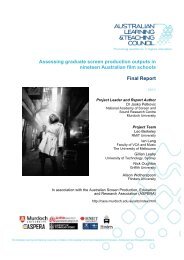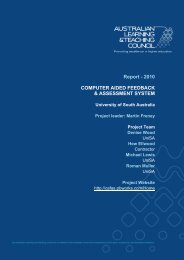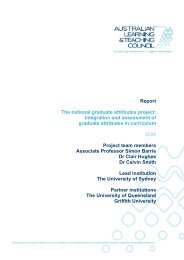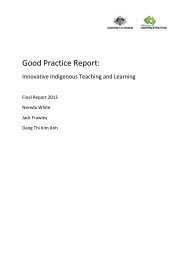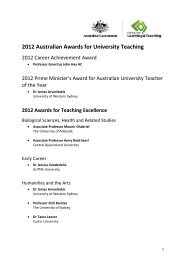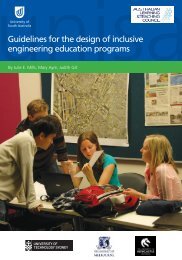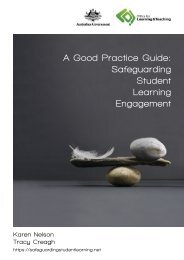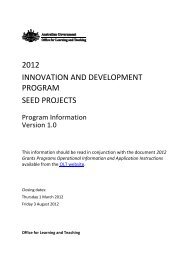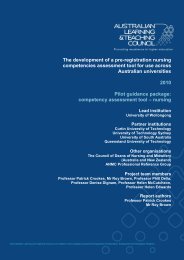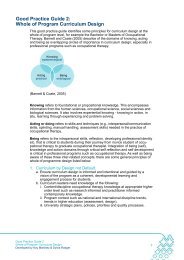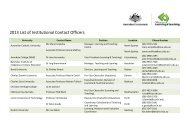national standards for psychological literacy and global citizenship
national standards for psychological literacy and global citizenship
national standards for psychological literacy and global citizenship
You also want an ePaper? Increase the reach of your titles
YUMPU automatically turns print PDFs into web optimized ePapers that Google loves.
Strengths <strong>and</strong> Challenges of the Project Management Process<br />
A review of Professor Cranney’s report indicates an impressive vision <strong>for</strong> the<br />
Fellowship <strong>and</strong> a challenging (but largely achieved) set of outcomes pointing to success. Her<br />
vision was a broad <strong>and</strong> sweeping one. I believe it is clear that this project would not have<br />
come to fruition (especially in a relatively short time frame <strong>for</strong> something of this magnitude)<br />
without funding from the Fellowship award <strong>and</strong> accompanying time off from some of her<br />
normal duties as a faculty member. That so much was accomplished—literally on both a<br />
<strong>national</strong> <strong>and</strong> a <strong>global</strong> scale—attests to the project’s success. As Professor Cranney notes, one<br />
of the chief challenges of managing the project <strong>and</strong> moving it <strong>for</strong>ward was gaining interest<br />
<strong>and</strong> cooperation from various stakeholders in addition to the Fellowship team. Professional<br />
bodies <strong>and</strong> educators <strong>and</strong> education networks all had to become engaged <strong>and</strong> convinced that<br />
relevant activities (e.g., considering changes to accreditation <strong>st<strong>and</strong>ards</strong>) were worthy pursuits,<br />
that the ideas <strong>and</strong> constructs (i.e., PL, <strong>global</strong> <strong>citizenship</strong>) were worthy, <strong>and</strong> so on. What is<br />
clear is that Professor Cranney <strong>and</strong> her colleagues (both in Australia <strong>and</strong> beyond) managed to<br />
achieve a high degree of what in the US is called “buy in”—that is, where disparate<br />
constituencies with often competing visions <strong>and</strong> values are able to agree on a core set of ideas<br />
as a means to further them. Generally speaking, that appears to be what happened as a result<br />
of ef<strong>for</strong>ts based in or developing from the project management process. The key issue is—<br />
<strong>and</strong> will remain—sustaining interest <strong>and</strong> enthusiasm at all levels <strong>for</strong> the goals of the<br />
Fellowship. Based on Professor Cranney’s evaluative report, I believe there is good reason<br />
<strong>for</strong> optimism on this front, as the next section of this report indicates.<br />
Success of the Dissemination Strategies as of August 2012<br />
The scope of the activities resulting from the Fellowship—<strong>for</strong>mal <strong>and</strong> in<strong>for</strong>mal,<br />
meetings, presentations, discussions, publications, committee works, among other ef<strong>for</strong>ts—is<br />
nothing less than dramatic. The number of people who have become interested in or involved<br />
in works promoting PL <strong>and</strong> <strong>global</strong> <strong>citizenship</strong> in Australia <strong>and</strong> around the world is quite<br />
remarkable (see also the discussion of issues of sustainability <strong>and</strong> impact in the Fellowship<br />
evaluation report). Noteworthy outcomes include the creation of web sites dedicated to PL<br />
<strong>and</strong> <strong>global</strong> <strong>citizenship</strong>, networking via email, <strong>and</strong> through scholarly publications (e.g.,<br />
Cranney & Dunn, 2011) <strong>and</strong> myriad professional talks <strong>and</strong> presentations. Naturally, an ongoing<br />
goal is that the dissemination strategies (<strong>for</strong> a full list, see Professor Cranney’s report)<br />
should lead to new, related initiatives. Arguably, any initiatives resulting from the Fellowship<br />
ef<strong>for</strong>ts can be counted as a success, but those that deal with serious, sustained changes in<br />
curricula, departmental or program planning, or organizational educational philosophy are<br />
those that are likely to have the greatest long term impact. My own hope is that Professor<br />
Cranney will write <strong>and</strong> publish a review article (with appropriate dissemination links posted<br />
on the web sites <strong>and</strong> via email networks) on the successful outcome of the Fellowship’s<br />
ef<strong>for</strong>ts to promote PL <strong>and</strong> <strong>global</strong> <strong>citizenship</strong> five years after the <strong>for</strong>mal end of the project.<br />
Utility of the Project’s Deliverables <strong>for</strong> Relevant Stakeholders<br />
Any innovative pedagogy, especially one with a novel philosophy with broad goals,<br />
must ultimately be useful. The issue of utility or applicability is important because educators<br />
<strong>and</strong> academic programs will not adopt new initiatives if they do not prove to be helpful.<br />
Relevant stakeholders here include those listed in Appendix C from Australia as well as<br />
interested inter<strong>national</strong> colleagues (see, <strong>for</strong> example, authors of chapters in Cranney & Dunn<br />
[2011], as well as Halpern [2010]). All of the project’s deliverables will help interested <strong>and</strong><br />
motivated stakeholders to focus on issues of accreditation, the place <strong>and</strong> role of PL <strong>and</strong><br />
scientific <strong>literacy</strong>, <strong>global</strong> <strong>citizenship</strong> within the psychology major, the importance of a<br />
capstone experience within UG education (during year 3 in Australia, year 4 in the US),<br />
professional opportunities <strong>for</strong> 3-year graduates (i.e., certificates, minors), refined <strong>and</strong><br />
enhanced learning outcomes linked to professional organizations (APS, APA), among other<br />
initiatives. All of these initiatives are prompting needed discussions about the future of UG<br />
education in psychology in Australia <strong>and</strong> around the world. This Fellowship project <strong>and</strong> the<br />
impact of its outcomes are reminiscent of the Bologna process in Europe <strong>and</strong> certainly will<br />
NATIONAL STANDARDS FOR PSYCHOLOGICAL LITERACY AND GLOBAL CITIZENSHIP 78



